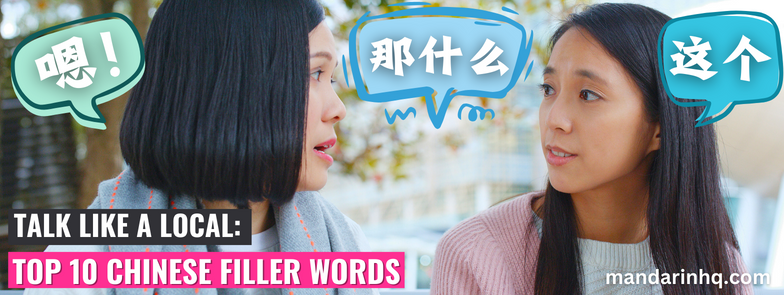Ever feel stuck for words while speaking Chinese? You're not alone!
Native speakers use filler words to bridge pauses and sound more natural. But what exactly are they saying, and why?
In this lesson we dive deep into the Top 10 Chinese Filler Words and show you their meanings and usage!
Summary Of "Top 10 Chinese Filler Words" From The Video Above
#1: 嗯 (én): This is an interjection similar to "um" or "uh" in English. It's often used when someone is pausing to gather their thoughts or to indicate agreement.
Example:
嗯 (én): "嗯,我明白了你的意思。Ēn, wǒ míngbái le nǐ de yìsi." (Hmm, I understand what you mean.)
#2: 呃 (è): Another interjection similar to "um" or "uh." It's used when someone hesitates or pauses in speech, often indicating uncertainty or hesitation.
Example:
呃 (è): "呃... 我需要一点时间来考虑。È... Wǒ xūyào yīdiǎn shíjiān lái kǎolǜ." (Um... I need some time to think about it.)
#3: 那什么 (nà shénme): Literally translates to "that what" but it’s similar to saying "Well..." or "So..." in English. It's often used when someone is trying to recall something or transition to a new topic. It can also indicate uncertainty.
Example:
那什么 (nà shénme): "那什么... 我们明天见面吧?Nà shénme... Wǒmen míngtiān jiànmiàn ba?" (So... shall we meet tomorrow?)
#4: 就是 (jiùshì): Translates to "it's just that" or "that is." It's commonly used to introduce a clarification or explanation, similar to the English phrase "you know."
Example:
就是 (jiùshì): "就是,我觉得我们应该尝试一下新的方法。Jiùshì, wǒ juédé wǒmen yīnggāi chángshì yīxià xīn de fāngfǎ." (You know, I think we should try a new approach.)
#5: 怎么说呢 (zěnme shuō ne): Translates to "how can I put it?." It's used when someone is trying to find the right words to express something or to introduce an explanation.
Example:
怎么说呢 (zěnme shuō ne): "怎么说呢... 他的态度让人有些不舒服。Zěnme shuō ne... Tā de tàidù ràng rén yǒuxiē bù shūfú." (How can I put it... his attitude makes me uncomfortable.)
#6: "这个 (zhèige) " and #7: "那个 (nèige)" : Literally mean "this" and "that." They're similar to "Well..." in English. And are often used as filler words when someone is trying to recall something or when they're hesitant in their speech.
Example:
这个 (zhèige) "这个... 我想问一下你的工资是多少?Zhèige... Wǒ xiǎng wèn yīxià nǐ de gōngzī shì duōshǎo?" (Well... I would like to ask what your salary is?)
Example:
那个 (nèige): "那个... 你可以借我五百块吗?Nèige... Nǐ kěyǐ jiè wǒ wǔbǎi kuài ma?" Well... can you lend me five hundred dollars?
#8: 对了 (duìle): Translates to "right" or "correct." This is used to indicate sudden recollection or realization, similar to "oh right" or "by the way" in English.
Example:
对了 (duìle): "对了!我刚才忘了告诉你,明天是我的生日。Duìle! Wǒ gāngcái wàngle gàosù nǐ, míngtiān shì wǒ de shēngrì." (Oh right! I forgot to tell you, tomorrow is my birthday.)
#9: 哦 (ó): An interjection similar to "oh" or "okay" in English. It's used to express acknowledgment, understanding, or surprise.
Example:
哦 (ó): "哦,原来是这样啊。Ó, yuánlái shì zhèyàng a." (Oh, so that's how it is.)
#10: 啊 (ā): This can be used to add emphasis or convey emotions like surprise, realization and agreement.
Example:
啊 (ā): "啊,我终于找到了我的钥匙了!Ā, wǒ zhōngyú zhǎodàole wǒ de yàoshi le!" (Ah, I finally found my keys!)
You might also find these posts interesting:

